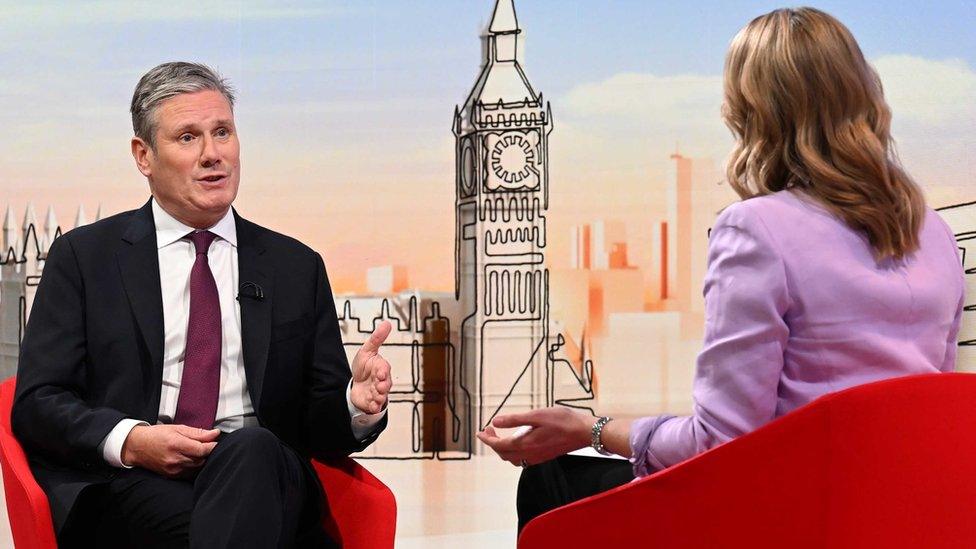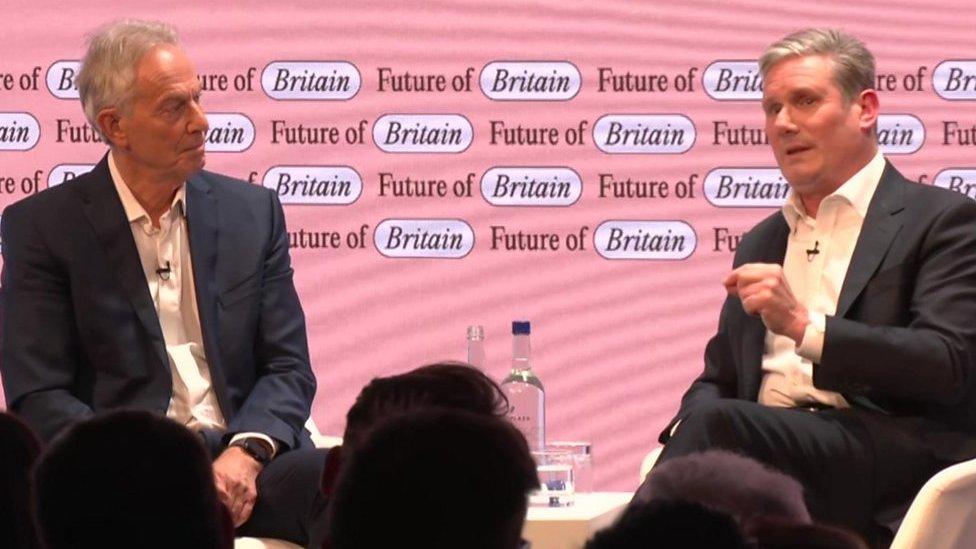Rishi Sunak takes aim at Labour over leader's support for two-child benefit cap
- Published
Watch: SNP criticises Labour child benefit cap stance at PMQs
Rishi Sunak has said he welcomed Labour leader Sir Keir Starmer's backing for the two-child benefit cap, as they clashed at Prime Minister's Questions.
The Labour leader has said he would not scrap the benefits policy if the party win the next general election.
It has sparked a backlash from some in his party, while the SNP has accused Labour of supporting child poverty.
A spokesman for Sir Keir said he would not make "unfunded spending commitments".
The issue came up at PMQs after the Labour leader grilled Mr Sunak over his government's NHS record in England.
The cap, which the Conservative government introduced in 2017, restricts child tax credit and universal credit to the first two children in a family, with only a few exceptions.
The SNP's Westminster leader, Stephen Flynn, said the policy had plunged more children into poverty in Scotland.
Analysis by the House of Commons Library commissioned by the SNP found that an additional 20,000 children in Scotland were placed into poverty as a result of the benefits cap.
Mr Flynn asked the prime minister if he took "comfort in knowing that the heinous legacy of that policy will no longer just be protected by Conservative members, but by Labour members too".
In reply, Mr Sunak said: "I welcome the Labour leader's newfound support for our policy, even though he previously committed to a different approach."
He added that Labour MPs did not have to worry about Sir Keir's position on this issue, "because given the Labour leader's track record, he has never actually kept a promise that he has made".
Sir Keir had supported scrapping the cap before he was party leader, but has since shifted his position, insisting that "tough choices" on spending are needed if Labour is to win the next election.
A spokesman for the Labour leader said: "We are not going to be in a position where we are advocating changes in policy that we cannot say how we can pay for it."
He declined to say whether it was an "aspiration" to reverse the policy or whether, if economic circumstances changed, removing the cap might be possible.
The BBC has been told that Sir Keir's refusal to abolish the cap will be challenged at a meeting of the party's policy forum this weekend.
His spokesman said no shadow cabinet ministers had threatened to resign over the issue.
With his party leading in the polls, Sir Keir has been seeking to stress his party's economic credibility, and he did so again at the final PMQs before Parliament's summer recess.
Financial feud
The Labour leader quizzed Mr Sunak over NHS waiting times, pointing out they have got longer since he took office last year.
The latest data shows that 7.4 million patients in England were waiting to start routine hospital treatment at the end of May.
Mr Sunak blamed the growing waiting list on strike action by junior doctors and consultants, who he urged to accept pay deals offered by the government.
PM Rishi Sunak blames industrial action for rising NHS waiting times in England
Sir Keir also criticised Mr Sunak over his government's NHS workforce plan, which he claimed was not costed.
The Labour leader asked: "Is his uncosted spending coming from more tax rises, more cuts, or is it just the latest spending promise to fall from the Tories' magic money tree?"
Mr Sunak said the chancellor would set out how the workforce plan would be funded in the next autumn statement.
The prime minister said he was "glad he's now interested in fiscal responsibility, which is very welcome".
Nodding to the tactics of Just Stop Oil protests, Mr Sunak urged Sir Keir to "unglue himself from the fence" and call on consultants and junior doctors to end their strike action.
Sir Keir has been reluctant to make any new spending commitments, as he seeks to avoid Tory accusations of economic irresponsibility.
In the past, the Conservatives have used the "magic money tree" line to attack Labour's plans for spending in government.
The Labour leader also highlighted a report from the National Audit Office, which showed the government is on track to break a key promise to build 40 new hospitals by 2030.
Despite this report, Mr Sunak insisted the pledge would be honoured, adding: "We're not just stopping there, we're also delivering 100 hospital upgrades across the country and crucially over 100 new community diagnostic centres to speed up treatment for people."
PMQs is expected to be back on the week starting 4 September, when Parliament returns from its summer recess.
Related topics
- Published16 July 2023

- Published18 July 2023

- Published18 July 2023
